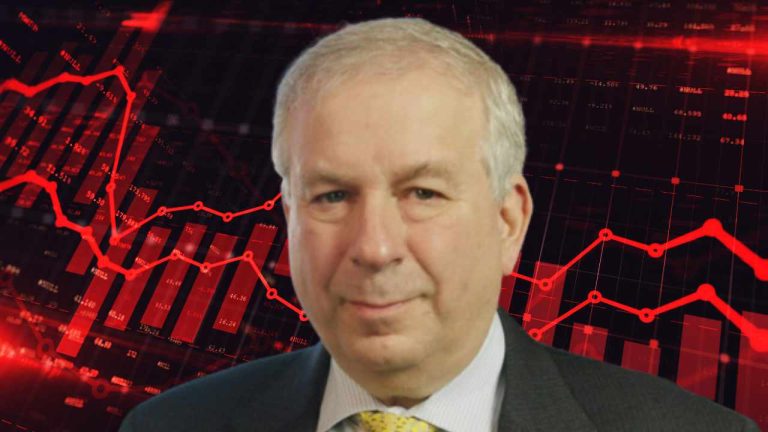 Economist Nouriel Roubini has shared his opinion about bank problems in the United States in a recently published opinion editorial. In the article, Roubini insists that “most U.S. banks are technically near insolvency, and hundreds are already fully insolvent.” Roubini: ‘Liquidity Support Cannot Prevent This Systemic Doom Loop’ The renowned economist Nouriel Roubini, also known […]
Economist Nouriel Roubini has shared his opinion about bank problems in the United States in a recently published opinion editorial. In the article, Roubini insists that “most U.S. banks are technically near insolvency, and hundreds are already fully insolvent.” Roubini: ‘Liquidity Support Cannot Prevent This Systemic Doom Loop’ The renowned economist Nouriel Roubini, also known […] Famed “Big Short” investor Michael Burry tweeted Thursday, telling his 1.4 million followers, “I was wrong to say sell.” The tweet follows Burry’s warning for months that the U.S. was headed for an “extended multi-year recession” and his decision to dump all of his stocks but one in August 2022. Burry: ‘I Was Wrong to […]
Famed “Big Short” investor Michael Burry tweeted Thursday, telling his 1.4 million followers, “I was wrong to say sell.” The tweet follows Burry’s warning for months that the U.S. was headed for an “extended multi-year recession” and his decision to dump all of his stocks but one in August 2022. Burry: ‘I Was Wrong to […] Investigative journalist James Corbett has recently referred to the ongoing global banking crisis involving SVB, Signature Bank, Credit Suisse and others as the “Panic of 2023,” drawing comparisons to what he views as historical precedents, and pointing ahead to an inevitable and bleak, technocratic surveillance future leveraging central bank digital currencies (CBDCs) should nothing be […]
Investigative journalist James Corbett has recently referred to the ongoing global banking crisis involving SVB, Signature Bank, Credit Suisse and others as the “Panic of 2023,” drawing comparisons to what he views as historical precedents, and pointing ahead to an inevitable and bleak, technocratic surveillance future leveraging central bank digital currencies (CBDCs) should nothing be […] Economist Peter Schiff has warned of “the biggest economic disaster” in U.S. history. He stressed that we are on the cusp of a financial crisis and “it’s going to be much bigger than the last.” In addition, he said the U.S. dollar is being debased in order to fund the bank bailouts. Peter Schiff Foresees […]
Economist Peter Schiff has warned of “the biggest economic disaster” in U.S. history. He stressed that we are on the cusp of a financial crisis and “it’s going to be much bigger than the last.” In addition, he said the U.S. dollar is being debased in order to fund the bank bailouts. Peter Schiff Foresees […]
To stay recession-proof, build an emergency fund, cut expenses, diversify investments, pay off debt and enhance your skills.
A recession is a period of economic decline that can impact individuals and businesses alike. It’s important to take steps to prepare for a recession to help minimize the potential negative impact on your finances. Here are some strategies to consider:
Building an emergency fund is one of the most critical steps to take to prepare for a recession. One may aim to save at least three to six months’ worth of living expenses in a separate account. This money can be used to cover their basic expenses in case of job loss or other financial hardships.
8 lessons for life:
— M O R E (@OwnFoundations) March 24, 2023
1. Health over wealth
2. Know when to pivot
4. Become self-sufficient
5. Invest in you education
6. Pick your battles wisely
7. Have an emergency fund
8. Build several income streams
During a recession, losing a job and struggling to find a new one is a possibility. Without an emergency fund, relying on credit cards or loans to pay bills and living expenses can lead to accumulating debt and financial stress.
On the other hand, having an emergency fund can provide one with a safety net to cover expenses during unemployment. This can help individuals avoid taking on high-interest debt and provide peace of mind during a challenging financial time. By building an emergency fund, one can better weather the economic fluctuations and safeguard their financial well-being.
Paying down debt is another critical step to take in preparation for a recession. The less debt one has, the more financial flexibility they’ll have during tough times. One can start by paying off high-interest debt first, such as credit cards or personal loans.
Related: What is network effect?
By paying down debt, individuals free up cash flow that can be used to cover necessary expenses or invest in more stable assets.
Reducing unnecessary expenses can free up more money to put toward building one’s emergency fund and paying down debt. Consider cutting back on dining out, entertainment and other non-essential spending to save money.
Additionally, minimizing discretionary spending can help individuals avoid accumulating high-interest debt, which can further strain their finances during a recession. By living below one’s means and focusing on essential expenses, they can better weather economic downturns and protect their financial well-being.
Having diversified investments across multiple asset classes can help protect one’s portfolio from market volatility and potentially reduce risk.
Therefore, investing in a variety of assets, such as stocks, bonds, cryptocurrencies and real estate, can help mitigate the risk of a recession. Diversifying one’s investments can provide some stability during an economic downturn.
It’s crucial to evaluate your job security and look for ways to increase your income or improve your skills to make yourself more valuable to your employer.
Recession Proof! pic.twitter.com/EBP0PVUhvd
— Gus (@wallstgoat) March 24, 2023
This could mean taking on additional responsibilities or seeking out additional training or certifications to make yourself a more valuable employee.
Related: Top 5 universities to study blockchain in the UK
Cryptocurrencies are not entirely recession-proof, as they are still subject to market volatility and economic downturns. While some proponents of cryptocurrencies argue that they offer a hedge against traditional investments during a recession, there is still a high level of uncertainty and risk involved in investing in cryptocurrencies.
During a recession, cryptocurrencies can experience significant price fluctuations, which can lead to substantial losses for investors. Additionally, because cryptocurrencies are a relatively new and unregulated asset class, they are vulnerable to market manipulation and fraud, which can further increase risk.
That said, some investors may still view cryptocurrencies as a potential recession-proof investment due to their decentralization and potential for long-term growth. However, it’s essential to remember that cryptocurrencies should be considered a high-risk, speculative investment, and investors should approach them with caution and do thorough research before investing.
Magazine: Best and worst countries for crypto taxes — Plus crypto tax tips
 After the recent bank collapses in the U.S., a number of people believe that more failures are coming following the Federal Reserve’s increase of the benchmark interest rate by 25 basis points (bps). American journalist Charles Gasparino insists that Wall Street’s “low-rate” junkies are ignoring the U.S. banking crisis. Quill Intelligence CEO Danielle DiMartino Booth […]
After the recent bank collapses in the U.S., a number of people believe that more failures are coming following the Federal Reserve’s increase of the benchmark interest rate by 25 basis points (bps). American journalist Charles Gasparino insists that Wall Street’s “low-rate” junkies are ignoring the U.S. banking crisis. Quill Intelligence CEO Danielle DiMartino Booth […] Famed economist David Rosenberg has warned of a “crash landing” and an impending recession for the U.S. economy. Referring to the Philadelphia Fed’s manufacturing index chart, he stressed: “Take a good hard look at this chart and tell me we are heading into a ‘soft’ or ‘no’ landing. More like a ‘crash’ landing.” Economist Expects […]
Famed economist David Rosenberg has warned of a “crash landing” and an impending recession for the U.S. economy. Referring to the Philadelphia Fed’s manufacturing index chart, he stressed: “Take a good hard look at this chart and tell me we are heading into a ‘soft’ or ‘no’ landing. More like a ‘crash’ landing.” Economist Expects […]
Bloomberg Intelligence senior macro strategist Mike McGlone says recent US bank failures are changing the way investors view Bitcoin (BTC). In a new live stream with Scott Melker, McGlone says an increasing number of investors are likely going to start buying Bitcoin as a valuable alternative asset outside of the traditional monetary system. “Now I fully […]
The post Bloomberg Analyst Says Bitcoin (BTC) Undergoing Fundamental Paradigm Shift as US Banking System Faulters appeared first on The Daily Hodl.

The Galaxy Digital CEO predicts tough times ahead for the U.S. economy, but continues to be bullish on crypto.
The United States is headed for a credit crunch and now is the right time to buy gold, silver and Bitcoin (BTC), says Galaxy Digital founder and CEO Michael Novogratz.
“We are going to have a credit crunch in the U.S. and globally,” Novogratz explained in an interview on CNBC. "You want to be long gold and silver [...] and you want to be long Bitcoin,” he said.
Speaking on CNBC’s Squawk Box on March 15, Novogratz noted that banks typically rebuild capital by lending less, meaning that a credit crunch is imminent, noting that indicators like the commodities market are already pointing to a recession.
The U.S. banking industry fell into turmoil this month, with Silvergate Bank, Signature Bank, and Silicon Valley Bank (SVB) all collapsing in the same week. Moody's downgraded the U.S. banking system outlook to "negative."
Related: Blame traditional finance for the collapse of Silicon Valley Bank
In the interview, Novogratz suggested a reversal in interest rate policy was on the cards, saying that while the Federal Reserve would “like to do a dovish hike, just for credibility’s sale,” doing so would be a “huge policy error.”
Alongside his prediction of tough times for the U.S. economy, Novogratz expressed a bullish sentiment for crypto, saying:
“If there was ever a time to be in bitcoin and crypto, this is why it was created, in that governments print too much money whenever the pain gets too great, and we’re seeing that.”
The price of Bitcoin dipped after the collapse of Silicon Valley Bank last week but managed to reach new 2023 highs of $26,514.72 on March 14, according to CoinMarketCap.
Looks like Bitcoin is moving on from its risk asset days. As more and more people begin to understand its fundamental value case, the market is slowly turning to Bitcoin as a digital form of gold.
— Handre van Heerden (@Handrev) March 14, 2023

BTC margin and options markets are steady, even as investors run for cover as crypto and stock prices fall.
Bitcoin (BTC) traders saw continued downward pressure after the 5.5% decline in BTC price on March 7. Increased odds of further interest rate increases by the Federal Reserve and regulatory pressure in cryptocurrencies explain some of the movement.
Financial markets showed signs of stress as the inverted bond curve reached its highest level since the 1980s. Longer-term dated yields have stalled at 4%, while two-year treasury notes traded above 5% yield in March.
Since July, longer-dated treasury yields have failed to keep pace with the surging two-year benchmark, resulting in the inverted curve distortion that typically precedes economic downturns. According to Bloomberg, the indicator reached a full percentage point on March 7, the highest level since 1981, when Fed Chair Paul Volcker faced double-digit inflation.
This week, BlackRock, the world's largest asset manager, increased its forecast for U.S. federal funds to 6%. Rick Riede, chief investment officer of global fixed income at BlackRock, believes the Fed will keep interest rates high for "an extended period to slow the economy and get inflation down to near 2%."
According to a Wall Street Journal report, the Biden administration wants to apply the wash sale rule to crypto, which would put an end to a strategy in which a trader sells and then immediately buys digital assets for tax purposes.
Furthermore, the Public Company Accounting Oversight Board (PCAOB), an organization that keeps an eye on audits of public companies in the United States, recently put out a warning to investors about proof-of-reserves reports that auditing firms send out.
The organization, backed by the U.S. Securities and Exchange Commission (SEC), said that: “investors should note that PoR engagements are not audits and, consequently, the related reports do not provide any meaningful assurance.”
Let's look at derivatives metrics to better understand how professional traders are positioned in the current market conditions.
Margin markets provide insight into how professional traders are positioned because it allows investors to borrow cryptocurrency to leverage their positions.
For example, one can increase exposure by borrowing stablecoins and buying Bitcoin. Borrowers of Bitcoin, on the other hand, can only take short bets against the cryptocurrency.

The above chart shows that OKX traders' margin lending ratio dropped dramatically on March 9, moving away from a situation that previously favored leverage long positions. Given the general bullishness of crypto traders, the current margin lending ratio at 16 is relatively neutral.
On the other hand, a margin lending ratio above 40 is very rare, even though it has been the norm since Feb. 22. It is partially driven by a high borrowing cost for stablecoins of 25% per year. Following the recent anomaly, the margin market has returned to a neutral-to-bullish state.
Traders should also analyze options markets to understand whether the recent correction has caused investors to become more risk-averse. The 25% delta skew is a telling sign whenever arbitrage desks and market makers overcharge for upside or downside protection.
The indicator compares similar call (buy) and put (sell) options and will turn positive when fear is prevalent because the premium for protective put options is higher than the premium for risk call options.
In short, if traders anticipate a Bitcoin price drop, the skew metric will rise above 10% and generalized excitement has a negative 10% skew.
Related: US REPO task force names crypto as target in efforts involving $58B in sanctioned assets

Even though Bitcoin failed to break the $25,000 resistance on Feb. 21 and then experienced a 14% correction in 16 days, the 25% delta skew remained in the neutral zone for the past month. The current positive 3% skew indicates a balanced demand for bullish and bearish option instruments.
Derivatives data shows that professional traders are unwilling to go bearish, as evidenced by options traders' neutral risk assessment. Furthermore, the margin lending ratio indicates that the market is improving as some demand for bearish bets has emerged, but the structure remains neutral-to-bullish.
Given the enormous downward price pressure from a macroeconomic standpoint, as well as ongoing regulatory pressure in the United States, bulls should probably be content that Bitcoin derivatives have remained solid.
The views, thoughts and opinions expressed here are the authors’ alone and do not necessarily reflect or represent the views and opinions of Cointelegraph.
This article does not contain investment advice or recommendations. Every investment and trading move involves risk, and readers should conduct their own research when making a decision.